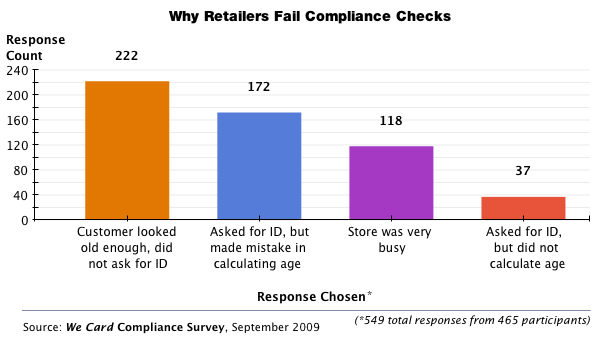Top 4 Reasons For Compliance Failure
Just about everyone who works behind the counter in a convenience store or a grocery store knows by now that it's against the law to sell tobacco to minors.
So why do retailers still fail compliance checks?
We Card surveyed retailers who had failed a state compliance check, and about 48% percent of those surveyed said they sold to a minor because the customer standing at the counter "looked old enough" so they didn't bother to check ID. Other common reasons included mistakes in calculating the customer's age, not reading the ID closely and being in too much of a hurry because the store was busy.

George DeLoach, the director of compliance at E-Z Mart Stores Inc., runs internal stings at 300 stores operated by the company in Texas, Oklahoma, Arkansas, Louisiana and Missouri. He said that sales associates rarely sell tobacco to a minor intentionally.
"When an employees fails, usually one of the biggest things is they didn't ask for ID," DeLoach said. "Because they assumed by looking at them that the person's old enough or they think they recognize them from a previous sale."
Illegal tobacco sales have declined dramatically in the past decade. A little over ten years ago, 40 percent of retailers failed state compliance checks. Today the figure is fewer than 10 percent. But with recent legislation that gives the FDA authority to regulate tobacco, retailers can expect more scrutiny than ever. And even without a new FDA managed compliance structure, some states currently impose fines that can be as high as $10,000.
Maureen Shanta, an assistant special agent in charge with the ABLE Commission in Oklahoma, where she oversees a team of tobacco enforcement agents, said that retailers generally understand the law and the penalties. "It's not that they don't care. They do care," she said. "Usually the error occurs when they are busy or distracted."
She said that younger clerks have the most trouble checking ID and refusing a sale. "They're inexperienced," she said. "I don't think they have the skills necessary to say, 'I'm sorry. It's against the law for me to sell these to you.'
A We Card survey of retailers who attended Instructor-led training pointed to the need for in-depth training that gives retailers practice with checking ID, calculating age and refusing a sale. The survey found that knowing the law and the penalties is not enough and that retailers feel the biggest challenges are dealing with customer confrontations, spotting fake IDs and knowing when to ask for ID.
"There's more to helping people do their jobs than skills and knowledge," said Doug Reed, the Director of Instructional Design at We Card. "Just knowing something is not good enough. They need to practice what they know, and make it part of their routine for every tobacco sale."
Wilson Farms, a chain of convenience stores in New York State, runs a comprehensive prevention program that includes hands-on training, in-house compliance checks and a combination of rewards and zero tolerance for sales associates who fail a compliance check. Fran Davis, the director of point of sale and operations for Wilson Farms, said that her company focuses on stores near college campuses and other areas with large numbers of underage customers. Her office also sends out reminders to every store about coming events, such as the local prom, that will bring underage customers into the store trying to buy tobacco and alcohol.
She said that young sales associates have a tough time refusing a sale, especially when the underage customer is a friend, classmate or neighbor.
"One of the reasons retailers fail is they don't address peer pressure in their training," Davis said. "We give them the role playing so they know what to do. The other important thing is the manager backs up the associate when they refuse the sale."
But it all comes back to asking for ID and following the right steps to ensure an underage sale is rejected. We Card training stresses the idea of asking the right question at the time of a tobacco purchases. Retailers should be asking themselves "Is this tobacco customer under 27?" instead of "Is this customer old enough?"
"Our training programs drive the Think 27 message home and our training tools and learning exercises stress the Think 27 theme," says Doug Reed, "If we can change the way tobacco sales associates think at the sale counter, we can impact youth access at retail even more."





